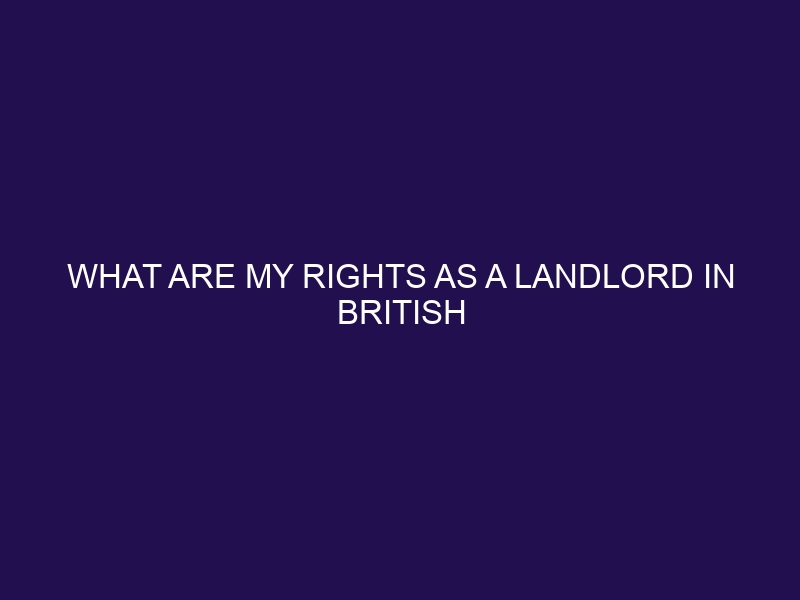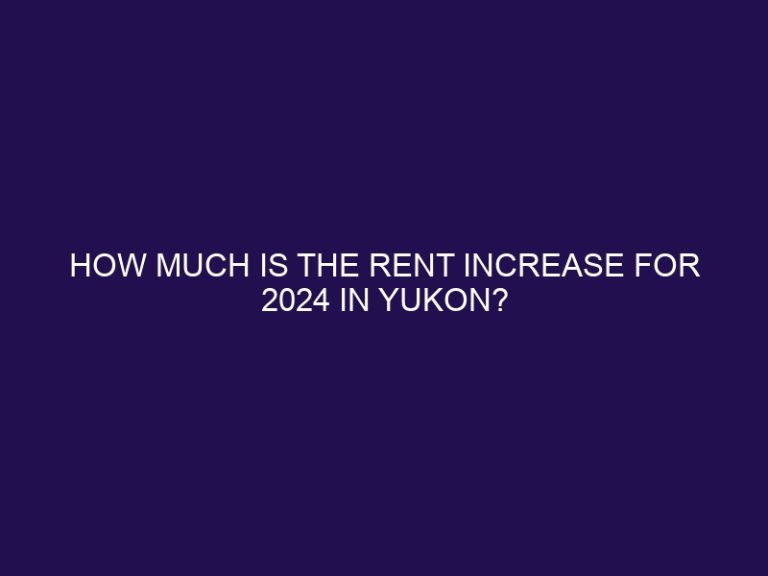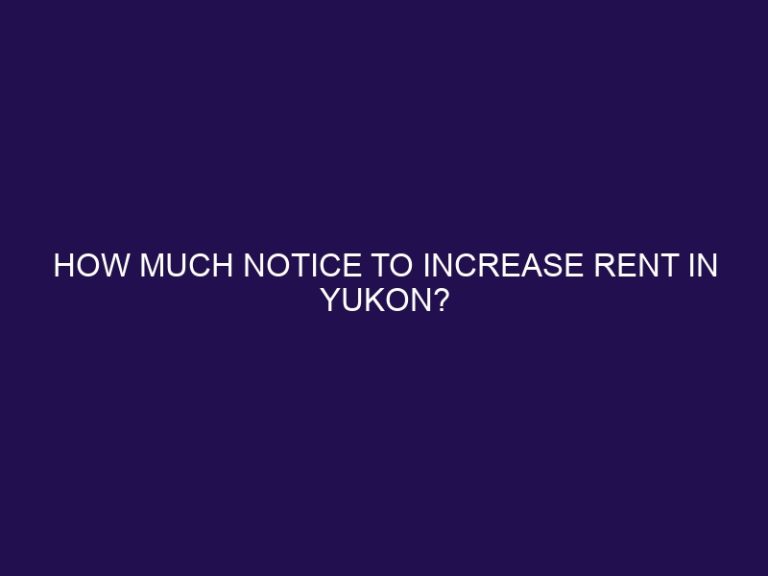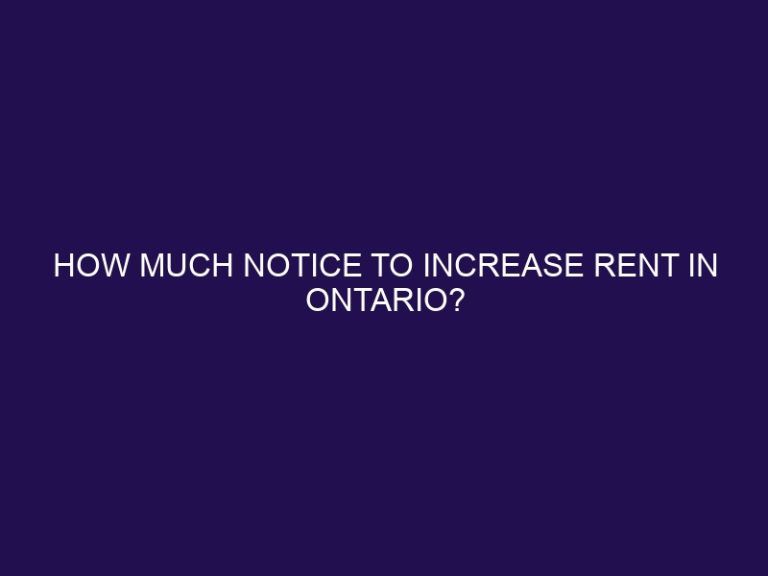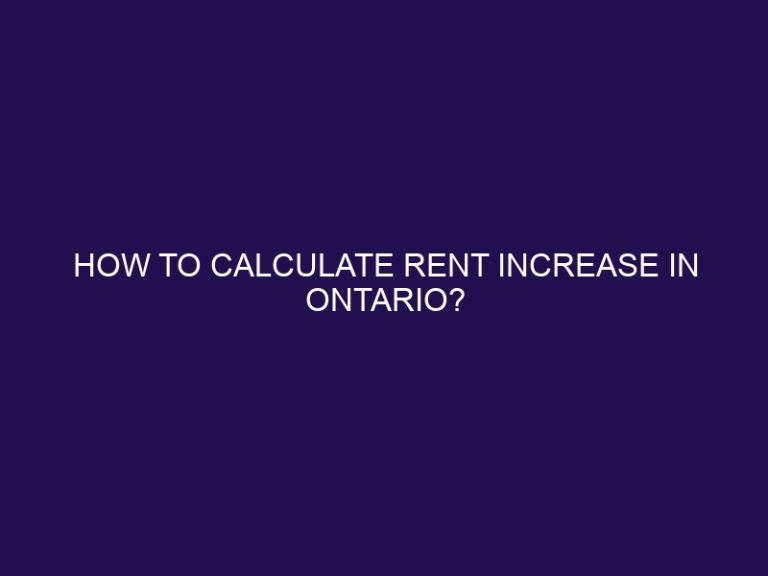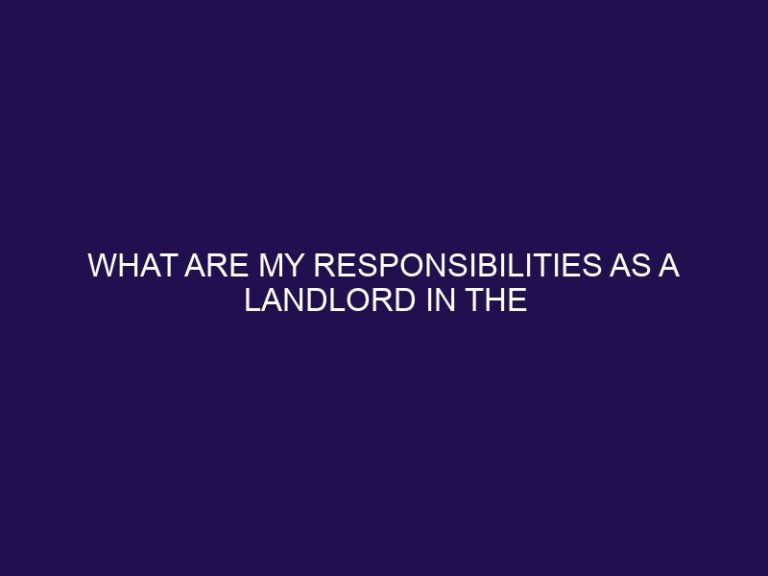What are my rights as a landlord in British Columbia?
.jpg)
As a landlord in British Columbia, it is vital to understand your rights and responsibilities to ensure a smooth and lawful landlord-tenant relationship. The Residential Tenancy Act outlines the legal obligations that landlords must adhere to. This article will provide an overview of the rights and responsibilities of landlords in British Columbia.
Legal Obligations and Responsibilities of Landlords in British Columbia
The Residential Tenancy Act is the primary legislation governing landlord-tenant relationships in British Columbia. It lays out the rights and responsibilities of both parties involved. As a landlord, it is crucial to familiarize yourself with this act to ensure compliance and avoid legal issues.
Some key areas covered in the act include:
- Understanding the Residential Tenancy Act: Familiarize yourself with the legislation to ensure you understand your obligations and the rights of your tenants.
- Responsibilities for Maintenance and Repairs: As a landlord, you have a legal obligation to maintain the rental property and address any necessary repairs promptly.
- Respecting Tenants’ Privacy and Rights: It is essential to respect your tenants’ privacy and uphold their rights as outlined in the Residential Tenancy Act.
What Can Landlords Legally Do in British Columbia?
In addition to understanding your obligations, it is crucial to be aware of what landlords are legally allowed to do in British Columbia. This section will cover some key areas, including:
- Setting Rental Rates and Security Deposits: Learn about the rules surrounding rental rates and security deposits to ensure you are compliant.
- Enforcing Rental Agreements and Lease Terms: Understand your rights as a landlord when it comes to enforcing rental agreements and lease terms.
- Entering Rental Properties: Notice and Access: Know the proper procedures for entering rental properties, including providing adequate notice to tenants.
- Dealing with Noise, Pets, and Smoking: Familiarize yourself with the rules regarding noise levels, pet policies, and smoking restrictions to maintain a harmonious living environment for all tenants.
What Are the Rights of Landlords in Dispute Resolution?
In the event of a dispute between landlords and tenants, it is important to understand the rights available to landlords in the dispute resolution process. This section will shed light on:
- Resolving Issues through the Residential Tenancy Branch: Learn about the process of resolving disputes through the Residential Tenancy Branch.
- Mediation and Arbitration: An Overview: Understand the options available for alternative dispute resolution, such as mediation and arbitration.
Tenant Eviction Rights and Procedures for Landlords
While eviction should be a last resort, landlords should be familiar with the rights and procedures surrounding tenant eviction. This section will cover:
- Valid Reasons for Eviction: Understand the legitimate reasons for evicting a tenant as outlined in the Residential Tenancy Act.
- Issuing Eviction Notices: Process and Requirements: Learn about the correct procedures and requirements for issuing eviction notices.
- Ending a Tenancy and Eviction Procedures: Familiarize yourself with the steps involved in ending a tenancy and conducting eviction proceedings.
How to Protect Yourself as a Landlord in British Columbia?
It is essential for landlords to take steps to protect themselves and their rental properties. This section will provide insights into:
- Understanding Landlord Insurance and Liability: Learn about the importance of having appropriate landlord insurance coverage and understanding your liability.
- Screening Potential Tenants: Legal Considerations: Gain an understanding of the legal considerations when screening potential tenants to ensure you find reliable and responsible individuals.
By understanding your rights and responsibilities as a landlord in British Columbia, you can ensure a positive and legally compliant rental experience for both you and your tenants.
Key takeaways:
- Know your legal obligations: Familiarize yourself with the Residential Tenancy Act in British Columbia to understand your responsibilities as a landlord, including maintenance, repairs, and tenant privacy rights.
- Understanding rental agreements: You have the right to set rental rates and enforce lease terms in accordance with the law. Make sure you are aware of the rules regarding security deposits, entering rental properties, noise, pets, and smoking.
- Resolving disputes: If a dispute arises, you can seek resolution through the Residential Tenancy Branch. Familiarize yourself with the procedures for eviction notices, ending a tenancy, and the rights and procedures of tenant eviction.
Legal Obligations and Responsibilities of Landlords in British Columbia
In British Columbia, being a landlord comes with a set of legal obligations and responsibilities that must be understood and adhered to. In this section, we will explore the Residential Tenancy Act, responsibilities for maintenance and repairs, as well as how to respect tenants’ privacy and rights. Delve into the nitty-gritty of landlord obligations and discover the essential information you need to know to navigate the rental landscape with confidence.
Understanding the Residential Tenancy Act
Understanding the Residential Tenancy Act is crucial for landlords in British Columbia to ensure they comply with the law and protect their rights. This act governs the relationship between landlords and tenants, outlining their respective obligations and responsibilities. Landlords must familiarize themselves with the act to understand the rules around setting rental rates, enforcing rental agreements, entering rental properties, dealing with noise and pet issues, and issuing eviction notices. It is essential to follow the proper procedures outlined in the act to avoid legal disputes with tenants and ensure a fair and lawful tenancy. Fact: The Residential Tenancy Act provides guidelines for both landlords and tenants to maintain a harmonious living arrangement.
Responsibilities for Maintenance and Repairs
Responsibilities for maintenance and repairs are essential for landlords in British Columbia. Here are some vital considerations:
- Regular maintenance: Landlords must ensure the property is in good condition by promptly addressing repairs and conducting regular inspections.
- Safe and habitable conditions: Landlords are responsible for providing a safe and livable environment, including functioning heating, plumbing, and electrical systems.
- Fixing damages caused by tenants: Landlords should repair damages caused by tenants, with the option to deduct the cost from the security deposit.
- Emergency repairs: Landlords bear the responsibility for immediate repairs in case of hazards or emergencies, such as broken pipes or electrical issues.
Pro-tip: To avoid disputes and ensure transparency, it is advisable to document the condition of the property before and after tenancies.
Respecting Tenants’ Privacy and Rights
Respecting tenants’ privacy and rights is of utmost importance for landlords in British Columbia. It is crucial to have a comprehensive understanding and comply with the privacy laws and regulations outlined in the Residential Tenancy Act. Landlords must ensure to give proper notice before entering the rental properties and honor the personal space of tenants. Moreover, landlords should address any concerns related to noise, pets, and smoking in a fair and reasonable manner. By valuing and respecting tenants’ privacy and rights, landlords can effectively maintain a positive and harmonious relationship with their tenants, thereby ensuring a safe and comfortable living environment.
What Can Landlords Legally Do in British Columbia?
Landlords in British Columbia hold certain rights, but it’s crucial to understand what they can legally do. From setting rental rates and security deposits to enforcing rental agreements and lease terms, this section explores the various aspects that landlords need to navigate. We’ll dive into the essential rules around entering rental properties, dealing with noise, pets, and smoking. Bursting with practical information, this section will ensure that landlords are well-informed and equipped to handle their responsibilities within the legal framework of British Columbia.
Setting Rental Rates and Security Deposits
Setting rental rates and security deposits is an important aspect of being a landlord in British Columbia. When determining rental rates and security deposits, landlords should consider factors such as location, amenities, and market demand. It is essential to set fair and competitive rates to attract tenants while ensuring a reasonable return on investment. Regarding security deposits, landlords are allowed to request a maximum of half a month’s rent as a deposit. This way, the deposit serves as a safeguard against any damage or unpaid rent. Landlords must adhere to the legal guidelines outlined in the Residential Tenancy Act to properly set and handle rental rates as well as security deposits.
Enforcing Rental Agreements and Lease Terms
Enforcing rental agreements and lease terms as a landlord in British Columbia involves a series of steps to safeguard your rights and maintain a professional rapport with tenants.
- Thoroughly examine the rental agreement: Familiarize yourself with every provision and condition outlined in the lease agreement.
- Effectively communicate expectations: Clearly convey rental rules, responsibilities, and expectations to your tenants.
- Record any violations: Keep a comprehensive record of any breaches of the rental agreement or lease terms.
- Serve written notices: In the event of a tenant’s violation, issue a written notice specifying the infringement and the necessary action to resolve it.
- Monitor and follow up: Continuously monitor the situation and ensure that the tenant complies with the required measures.
- Obtain legal support, if needed: If the tenant fails to rectify the violation, consider seeking assistance from a lawyer or seeking legal advice to determine the appropriate course of action.
Entering Rental Properties: Notice and Access
When it comes to entering rental properties in British Columbia, landlords have specific obligations to respect tenants’ privacy and rights. They must provide proper notice before entering a rental unit, typically 24 hours in advance, unless it is an emergency. This notice and access requirement is outlined in the Residential Tenancy Act of British Columbia. Landlords should communicate the purpose of their visit and ensure it aligns with legal reasons such as repairs, inspections, or showings to potential tenants. By following these guidelines, landlords can maintain a positive relationship with their tenants while fulfilling their responsibilities.
In British Columbia, the Residential Tenancy Act outlines the legal requirements and obligations for landlords and tenants, ensuring a fair and balanced rental market. The Act emphasizes the importance of proper notice and access when it comes to entering rental properties. Landlords must adhere to these requirements in order to uphold the rights and privacy of tenants and foster a respectful landlord-tenant relationship.
Dealing with Noise, Pets, and Smoking
- Noise: Establish clear rules regarding noise levels and quiet hours in the rental agreement. Address noise complaints promptly and take appropriate action, such as issuing warnings or fines.
- Pets: Specify pet policies in the rental agreement, including any restrictions, fees, or additional deposits. Follow applicable laws regarding assistance animals and consider implementing pet-related rules to maintain cleanliness and prevent damage.
- Smoking: Include a non-smoking policy in the rental agreement and clearly define designated smoking areas, if applicable. Communicate the policy to tenants and Smoking take necessary steps to enforce it, such as issuing warnings or implementing penalties for violation.
What Are the Rights of Landlords in Dispute Resolution?
Discover the rights of landlords when it comes to dispute resolution. From resolving issues through the Residential Tenancy Branch to navigating mediation and arbitration, this section sheds light on the procedures and requirements involved. Explore the intricacies of tenant eviction rights, the process of issuing eviction notices, and the steps for ending a tenancy. Stay informed about your rights as a landlord in British Columbia for a smoother and more efficient dispute resolution process.
Resolving Issues through the Residential Tenancy Branch
- Resolving issues through the Residential Tenancy Branch in British Columbia involves the following steps:
- Identify the issue or dispute with the tenant.
- Collect any evidence or documentation related to the issue.
- Contact the Residential Tenancy Branch and submit a formal application.
- Attend any scheduled mediation sessions or hearings.
- Present your case and provide supporting evidence.
- Follow any orders or decisions made by the Residential Tenancy Branch.
John, a landlord in British Columbia, had a dispute with his tenant over unpaid rent. He followed the steps above and resolved the issue through the Residential Tenancy Branch. By successfully navigating the process, John was able to maintain a positive landlord-tenant relationship.
Mediation and Arbitration: An Overview
Mediation and Arbitration: An Overview
Mediation and arbitration are two alternative methods of resolving disputes between landlords and tenants in British Columbia. Here is a brief explanation of the process:
- Mediation: Mediation involves a neutral third party who assists in facilitating a discussion between the landlord and tenant. The goal is to reach a resolution that is mutually agreeable to both parties. It’s important to note that the mediator does not have the authority to make decisions but instead helps the disputing parties find common ground.
- Arbitration: If mediation fails or is not chosen as an option, landlords and tenants can pursue arbitration. This process involves an impartial arbitrator who listens to both sides of the dispute and makes a binding decision. This decision is enforceable by law.
- Benefits: Mediation and arbitration provide a faster and potentially less expensive alternative to going to court. Additionally, these methods offer a more relaxed and cooperative environment for resolving conflicts.
- Considerations: Landlords should familiarize themselves with the rules, fees, and timelines associated with mediation and arbitration. It may be beneficial for them to seek legal advice before engaging in these proceedings.
Tenant Eviction Rights and Procedures for Landlords
Evicting a tenant in British Columbia requires following specific procedures as outlined in the Residential Tenancy Act, which ensures tenant eviction rights and procedures for landlords are properly followed. Here are the steps landlords must take:
- Provide written notice to the tenant specifying the reason for eviction, such as non-payment of rent or breaching the tenancy agreement.
- If the tenant does not comply or rectify the issue, file an Application for Dispute Resolution with the Residential Tenancy Branch to exercise tenant eviction rights.
- Attend the dispute resolution hearing and present evidence supporting your case in accordance with the required procedures for landlords.
- If the decision favors eviction, obtain an Order of Possession from the Residential Tenancy Branch to legally enforce the tenant eviction.
- Serve the tenant with the Order of Possession, ensuring that you comply with the proper procedures for tenant eviction in British Columbia.
- If the tenant still refuses to leave, apply for a Writ of Possession and involve the local sheriff to enforce the eviction, following the established procedures for landlords.
Pro-tip: It’s crucial to familiarize yourself with the Residential Tenancy Act and seek legal advice to ensure you properly follow the tenant eviction rights and procedures for landlords in British Columbia.
Issuing Eviction Notices: Process and Requirements
“`Issuing Eviction Notices: Process and Requirements
In British Columbia, issuing an eviction notice involves following a specific process and meeting certain requirements. Here are the steps to issuing an eviction notice:
Remember, it is crucial to understand the legal requirements and consult with a lawyer or the Residential Tenancy Branch for guidance. Eviction should always be a last resort, and communication and negotiation with the tenant are recommended to resolve issues amicably.
Ending a Tenancy and Eviction Procedures
When it comes to ending a tenancy and eviction procedures in British Columbia, landlords must follow specific legal steps to protect their rights and comply with the law. Here are the key steps to consider:
- Serve a notice: Provide the tenant with a written notice stating the reason for the eviction.
- File an application with the Residential Tenancy Branch: If the tenant does not comply with the notice, you can file an application for dispute resolution.
- Attend the hearing: Present your case to the Residential Tenancy Branch and provide any supporting evidence.
- Obtain a decision: If the Branch grants an eviction order, you can proceed with ending the tenancy.
- Issue a notice to end tenancy: Serve the tenant with an official notice to end the tenancy.
- Follow the required wait period: Allow the tenant the required notice period before taking further action.
- Enforce the eviction: If the tenant does not comply with the notice, you may need to involve the authorities to enforce the eviction.
Remember, when it comes to ending a tenancy and eviction procedures in British Columbia, it is crucial to familiarize yourself with the specific laws and regulations to ensure a smooth process and protect your rights as a landlord.
How to Protect Yourself as a Landlord in British Columbia?
Looking to safeguard your rights as a landlord in British Columbia? Dive into this section, where we’ll explore valuable methods to protect yourself. Discover the ins and outs of landlord insurance and liability, ensuring you have the necessary coverage. Plus, gain insights into legal considerations when screening potential tenants, empowering you to make informed decisions. Stay informed, proactive, and confident as a landlord in British Columbia.
Understanding Landlord Insurance and Liability
Understanding landlord insurance and liability is essential for landlords in British Columbia. In this province, landlord insurance plays a critical role in providing protection against property damage, liability claims, and loss of rental income. Moreover, liability coverage is of utmost importance as it safeguards landlords from potential lawsuits initiated by tenants or third parties due to injuries or damages that occur on the property. To ensure comprehensive coverage, it is vital for landlords to thoroughly review their insurance policies and make certain that they adequately address potential risks and liabilities. Additionally, landlords should familiarize themselves with their legal obligations and responsibilities to effectively minimize the risk of liability claims. By implementing proper maintenance practices, conducting regular inspections, and promptly addressing repairs, landlords can not only prevent accidents but also mitigate potential liability issues.
Screening Potential Tenants: Legal Considerations
- When screening potential tenants in British Columbia, it is crucial to consider the legal aspects. There are specific legal considerations that landlords must keep in mind during this process.
- To ensure fairness and avoid discrimination claims, it is essential to use consistent screening methods for all applicants. This way, you can provide equal opportunities to everyone.
- Prior to conducting background and credit checks, it is important to obtain written consent from the applicant. This consent allows you to proceed with the necessary verifications.
- As a landlord, it is your responsibility to verify the information provided by the applicant. This includes thoroughly checking their employment and income details.
- To safeguard the personal information of applicants, it is crucial to adhere to privacy laws when handling and storing their data. This ensures the protection of their privacy rights.
- Keeping detailed records of the entire screening process is highly recommended. This includes documenting all communication and decisions made throughout the process.
- When informing applicants of your decision, it is important to do so in a respectful and non-discriminatory manner. Clearly communicate the reasons behind the decision to maintain transparency.
Some Facts About Landlord Rights in British Columbia:
- ✅ Landlords in British Columbia have the right to collect rent from their tenants.
- ✅ They also have the right to enter the rental unit for reasonable purposes, but proper notice is required.
- ✅ Landlords can request a security deposit from tenants to protect against damages or unpaid rent.
- ✅ In certain circumstances, landlords have the right to evict tenants who violate the terms of the lease agreement.
- ✅ Landlords have the ability to raise the rent with certain restrictions set by the Residential Tenancy Act.
Frequently Asked Questions
What types of rental properties in British Columbia are covered under the Residential Tenancy Act (RTA)?
The RTA governs most rental housing in British Columbia, including single-family homes, condos, apartments, mobile homes, and shared accommodations.
Are short-term rentals, hotels, motels, retail stores, and office buildings covered under the RTA?
No, short-term rentals, hotels, motels, retail stores, and office buildings are not covered under the RTA.
Is a written tenancy agreement required for a tenancy to begin in British Columbia?
No, a written tenancy agreement is not necessary for a tenancy to begin. It can begin if a tenant moves into a rental property or pays a security deposit.
Which government agency is responsible for administering the RTA and helping resolve conflicts between landlords and tenants?
The Residential Tenancy Branch is the government agency responsible for administering the RTA and assisting landlords and tenants in resolving conflicts.
What are the tenant rights regarding privacy, rent hikes, move-in inspections, and overnight guests in British Columbia?
Tenants in British Columbia have the rights to peace, quiet, and privacy in their homes, proper notification before a rent hike, the ability to be present during move-in inspections, and the right to have overnight guests.
What are the landlord rights regarding rent collection, entry into the unit, security deposits, lease agreement violations, and rent increases in British Columbia?
Landlords in British Columbia have the rights to collect rent, enter the unit for reasonable purposes, request a security deposit, evict tenants for lease agreement violations, and raise rent within certain restrictions.

